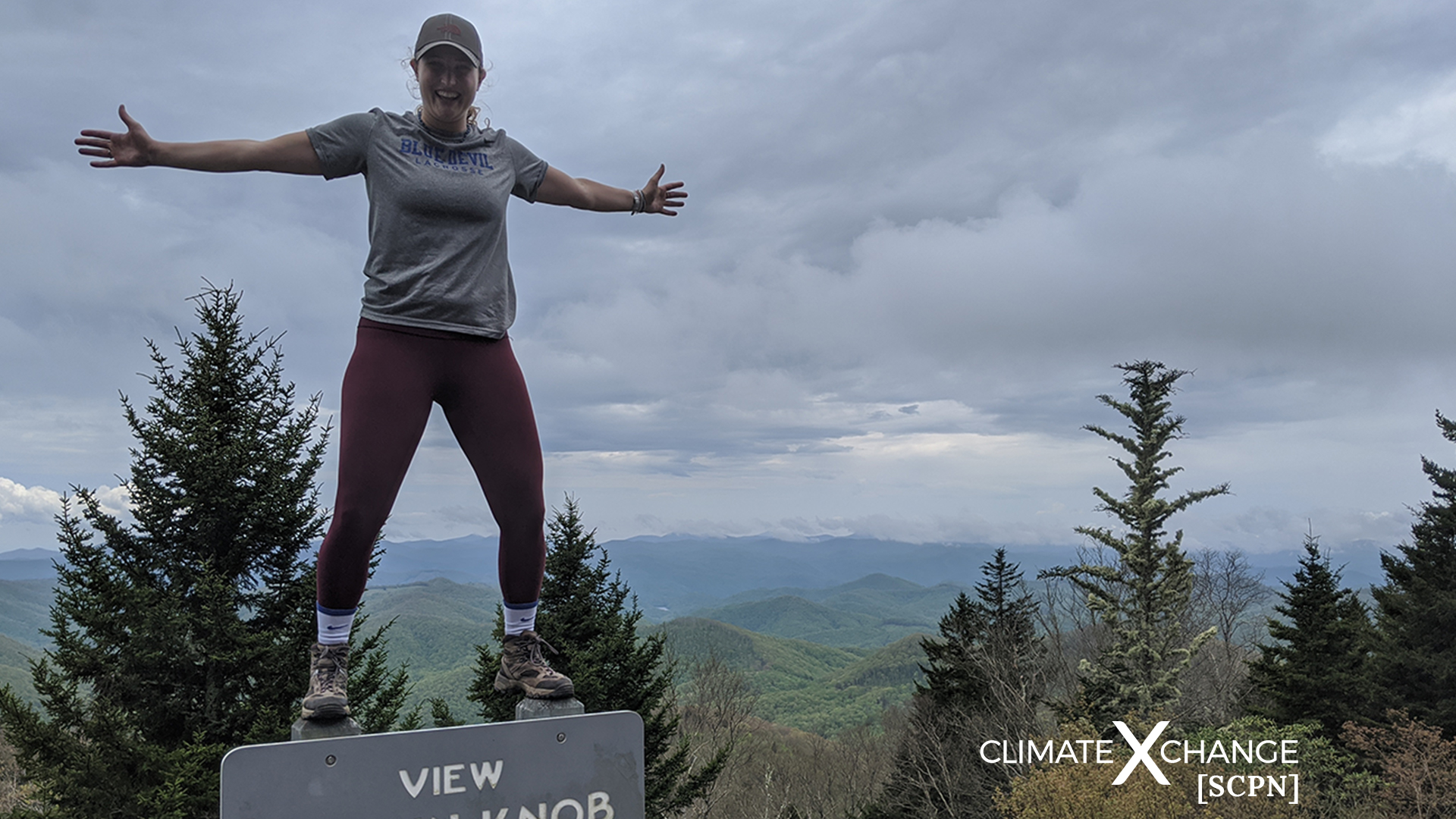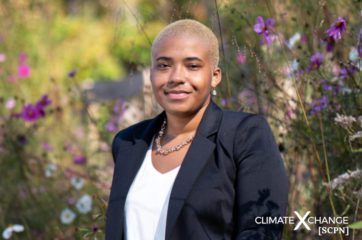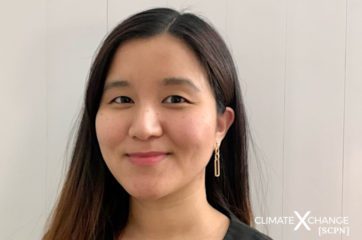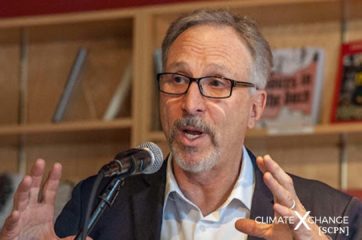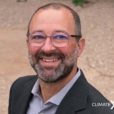All across the country, members of our State Carbon Pricing Network (SCPN) are fighting to make an impact on climate change in their communities. We have individuals in our Network from all 50 states, each experiencing climate change differently in their local areas and finding unique solutions to build resiliency efforts.
This week, we interviewed Jamie Lockwood, a woman who returned to her home of North Carolina to push for clean and safe energy policies after witnessing the destruction that hurricanes and increasing natural disasters have caused in her state. The interview has been lightly edited.

Carlie Clarcq (CC): Hi Jamie, thank you so much for speaking with me today! I’d love to first hear a little background about you, where you are, and what your current role is.

Jamie Lockwood (JL): Sure, of course. My name is Jamie Lockwood and I graduated from Duke University in 2019. I started working with Environment America in DC on federal issues concerning conservation, but I really wanted to work on climate in North Carolina because that’s where I’m from, and I care a lot about my state. So, I’m currently with our state affiliate Environment North Carolina as their Climate and Clean Energy Associate. I mainly work to promote a 100% renewable goal in North Carolina, in municipalities and local governments, as well as at the state level.

CC: Awesome, getting states to commit to that 100% renewable target is so important right now. I’m wondering what inspired you to get into this work, and if there is something in your local environment that motivates you?

JL: One of my most influential professors spoke with me about job searching, and told me that most people go about it all wrong. What you want to do is think about a problem in the world that you want to be part of the solution for, and center your job search around that, and I really took that to heart. Climate change is something that affects all of us, although disproportionately. It’s something I’ve been passionate about since a young age, because my family and I would always go on hikes and camping trips, which has made me prone to appreciate the world around us. I think that clean water to drink and clean air to breathe should be an accessibility for everyone, so that was the problem that I wanted to address, so I set forward to find a job that would allow me to do that.
As far as my local environment, what inspires me here is Pisgah National Forest — it’s actually a temperate rainforest in North Carolina, that I just absolutely fell in love with. It’s a really cool environment. Mangoes grow there, even though it’s in North Carolina. There are mountains, and absolutely gorgeous views. It’s amazing. Anyone from around here should go check it out.

CC: Wow, that’s so cool. I had no idea that was possible. Okay, so I’d love it if you could describe a moment when you realized that climate change was affecting your life, and how that made you feel.

JL: I think from a young age, I connected with climate change the most when I heard about habitat loss, and saw pictures of melting ice caps and polar bears, which were animals I loved as a kid. That’s a really easy connection to make as a kid, or for someone without a science background. That was my first passionate pull, but as I got older and started to study this issue, I realized that not having clean air to breathe, having unreliable weather patterns and negative agricultural effects all result from climate change. It’s just an all-encompassing problem that I think is slowly encroaching on people that are the most removed, and is drastically affecting people.
For me personally, I recently had to board up my windows living in North Carolina for Hurricane Florence, while thinking, “oh my gosh, we had a tornado two weeks ago.” These weather patterns are such a grander issue, and people are victims from this.

CC: Yeah, absolutely. Have you seen similar patterns, and those extreme weather events, worsen over time while you’ve been in North Carolina?

JL: Oh, definitely. Right now, we’re projected to have more frequent and more intense hurricanes, because the criteria for creating destructive hurricanes will become more frequent. As oceans are warming, this creates the ability for hurricanes to appear more. I definitely think the frequency and intensity has already worsened in my lifetime, and will continue at this level or likely get worse. I watched a presentation from the North Carolina Climate Change Institute this year and they said that the science proves that will happen, with a 90 to 100% probability rate.

CC: Oh wow, that’s high. Hopefully some of the work that you’re doing will be able to make an impact on that. So I guess to switch gears a bit, we could speak a little about the work that you’re doing right now. I’d love to learn more about that, and the steps that you’ve taken as an individual or in your community to respond to some of those affects you were just talking about.

JL: Yeah, in North Carolina, we rank in the top for both solar and wind energy. So, I really honed in on that and am trying to promote these clean energy sources so we can end our dependence on these dirty, dangerous fossil fuels that are causing the ocean to warm and worsening our hurricane season. I’ve done polling in coastal communities about offshore drilling and offshore wind, and I’ve recently created a montage of video testimonials describing why the coast is worth protecting from offshore drilling, and have promoted that in the General Assembly as well as on Capitol Hill. I’m also constantly writing op-eds and pushing them through papers. I also release reports, by adding to the data stream and bringing the media’s attention to the new data coming out about these issues.
Most recently, I published one in the Sun Journal in New Bern North Carolina, discussing how climate change is affecting North Carolina’s historic landmarks. We were founded on the coast, with New Bern as North Carolina’s oldest township. It is going to be completely underwater based off of sea level rise projections if we continue business as usual.
There are just so many reasons to care and to take action, I think the biggest thing we need to do is move away from fossil fuels both in the transportation sector as well as in the utility industry, because that’s North Carolina’s two largest emitters right now.

CC: Yeah, definitely. Well, congrats, that’s all very important work. It’s always great to hear from people who are dedicating their work to making a difference. I guess I’ll just ask, to wrap things up, how you imagine the future, and what advice you might give to others who care about this issue?

JL: I imagine a future where walking and biking to work is not only a norm, but we have cities with infrastructure that encourages safe walking and biking, including lots of walkable sidewalks and public transportation that is clean and convenient to use.
So, I encourage everyone to use the loudest voice you have, which I think is your vote. By using that, you can promote policies that can really make these wishes into a reality.

CC: Absolutely. Voting is so important, and we can really make an impact through our votes, especially at the local level where voter turnout is so low. I’ll just ask one last question, because I know there’s always so much negative news about climate policy, especially at the moment. So, what gives you optimism about solving the climate crisis?

JL: For me, it’s the potential. There was a time when people said that we didn’t have the technology to move away from fossil fuels, but we’ve reached the point where we have the solutions. Now, it’s just about deploying them. It’s about changing minds, it’s about letting people realize that we have the solutions. It’s time to invest in renewables; it’s time to make the switch.

